Today I’m taking you to a place you may not want to go: inside a prison. Why am I doing this? Because Jesus told us we could find him there. In his parable of the Final Judgment (Mt. 25:31-46) he lists some specific places we can find him and some specific acts we can do to show our love for him. These places include prison; these acts (later called “the works of mercy”) include visiting inmates.
But before I take you into a prison, I want to give a few facts. More than 10.2 million people are being held in penal institutions throughout the 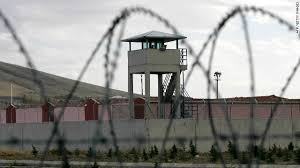 world. Almost half of them are being held in these three countries: the United States (2.24 million), China (1.64 million), and Russian (.68 million). The U.S. has the highest rate of prisoners per 100,000 people: 724. Here are a few other countries and their ratings per 100,000 people: Great Britain 148, Canada 118, Australian 133, Cuba 510, Iran 281, Mexico 211, China 172, Finland 58, El Salvador 424, India 30, France 103. It should be noted that China has a system of institutions for “re-education through labor” that it doesn’t count as prisons. And the statistics from North Korea are unknown, although estimates put their rate of incarceration as comparable to or even greater than the U.S.
world. Almost half of them are being held in these three countries: the United States (2.24 million), China (1.64 million), and Russian (.68 million). The U.S. has the highest rate of prisoners per 100,000 people: 724. Here are a few other countries and their ratings per 100,000 people: Great Britain 148, Canada 118, Australian 133, Cuba 510, Iran 281, Mexico 211, China 172, Finland 58, El Salvador 424, India 30, France 103. It should be noted that China has a system of institutions for “re-education through labor” that it doesn’t count as prisons. And the statistics from North Korea are unknown, although estimates put their rate of incarceration as comparable to or even greater than the U.S.
In the United States, what offenses have the prisoners committed? Here is a run-down: 48.8% drugs; 10.3% immigration; 6.6% sexual crimes; 6.1% extortion, fraud; 3.9% burglary; 2.9% homicide, aggravated assault, kidnapping. In the U.S. 93.3% of prisoners are male; 6.7% are female. By race, 59.3% are white; 37.3% are black; 1.9% native American; 1.5% Asian. In the U.S. nearly 160,000 prisoners are serving life-sentences. Two-thirds of those are Latino or black. The number of prisoners on death row is 3,049, with California, Florida, and Texas leading the way.
Those are some of the facts. Now let’s go inside a prison and meet a few of the inmates. Sister Patricia Schnapp, a Mercy Sister in Adrian, MI, will take us there. A college professor by profession, Sister Pat has ministered to prisoners for many years, teaching English classes and helping to conduct communion services there. She has written a book called Out of the Shadows, a collection of prose-poems about individuals she met in prison and in the homeless shelter where she also serves. She wrote about prisoners and other “invisible people” because they “deserve to be recognized and brought out of the shadow.” She says that meeting these people helped dispel her own stereotypes and  “reinforced the truth that nothing we do can erase our basic God-given dignity.” Here are a few of her students. (These are not their real names.)
“reinforced the truth that nothing we do can erase our basic God-given dignity.” Here are a few of her students. (These are not their real names.)
Charles: When his first assignment was returned, he looked for a grade. There was none. Spelling and grammar errors had been ignored. Class over, he approached the volunteer teacher scowling. Waving his paper at her like a warrant, he muttered, “I don’t like to be patronized!” So he wasn’t. The following week his paragraphs bled red ink, each sentence a candidate for Intensive Care. Lacerated fragments, broken tenses, arhythmic punctuation, clotted ideas, and ugly rash of usage errors. And at the bottom of the page a final, “You asked for it, Charles.” It took him some seconds to absorb the enormity of his literary feebleness. But then, looking up at the eyes of his gazing mentor, he grinned an Olympian grin.
Leonard: Well-educated and well-spoken, he brimmed with poise. The volunteer wondered, What could he be in for? During communion services he read the epistle eloquently and, at the Prayer of the Faithful, offered a lengthy litany of petitions. He was the only prisoner whose prayers included the guards. The other inmates clearly respected him for his intelligence and self-confidence. And after each service he always thanked the volunteer effusively, as if she’d saved his life. At some point, his trust grew enough that, with eyes cast down and in a whisper, he acknowledged his crime to the volunteer. He’d molested his young daughter. The confession and the shame seemed to wilt him. Turning to leave the chapel, he mumbled a furtive “Pray for me” with none of his usual composure.
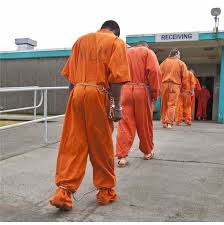 Dennis: “Fear,” he said, gray hair bent. “When I get out there, I don’t know if I’ll have the strength…” His voice vanished. Well, of course it will hound him, the addiction to crack. The Hound of Cocaine Heaven will leap over razor wire and stalk him after his release, will howl when possible employers figure odds and choose security. Doors will close. Dennis’ wife has left him. He doesn’t blame her, either. His college degree in engineering didn’t address the reconstruction of his life while battling an addiction always threatening to return. Frightened and disgraced, he hesitates to call himself a Son of God, and has branded himself just “felon.”
Dennis: “Fear,” he said, gray hair bent. “When I get out there, I don’t know if I’ll have the strength…” His voice vanished. Well, of course it will hound him, the addiction to crack. The Hound of Cocaine Heaven will leap over razor wire and stalk him after his release, will howl when possible employers figure odds and choose security. Doors will close. Dennis’ wife has left him. He doesn’t blame her, either. His college degree in engineering didn’t address the reconstruction of his life while battling an addiction always threatening to return. Frightened and disgraced, he hesitates to call himself a Son of God, and has branded himself just “felon.”
Tommy: Tommy’s eyes had lost luster since the previous month’s prison service. His hopes for parole had been dashed by a twelve month “flop.” Blond hair rimming the delicately boned face, he looked to be nineteen or twenty and was struggling not to cry. Asked if he’d been given a reason for his extension, he replied, “They said because of the emotional damage to the victim.” It wasn’t hard to speculate on the crime. And Tommy seemed to realize that this was an offense he could never make restitution for regardless of his remorse and good intentions. He shuffled back to his pew, perhaps trying to absorb the truth of sin’s irreversibility, aware that, as the perpetrator, he had done profound emotional damage to himself as well.
Samuel: Sometimes they asked the teacher hard questions. Samuel, for instance. During a brief lull in class he bounced up on his feet and asked out of the blue, “Do you love us?” He meant, of course, the students in this classroom with barred windows. Felons all. Samuel himself had said in a previous class, that the way you proved your manhood in his neighborhood was shooting somebody. And that he was a man. The teacher paused for a moment—as if there were multiple answers to choose from. Finally she said, “Yes, I love you.” But Samuel seemed to have anticipated that response and wasn’t ready to sit down yet. “Why?” he asked. This was clearly a much harder question to answer, but the teacher had to admire Samuel’s tenacity as he stood there, expectant, all of his face a question mark.
Today I took you inside a prison. Why? Because Jesus told us we could visit him there.
Did anything surprise you or touch you?
PS: If you are interested in getting Sister Pat’s book, send a check or money order for $12 ($10 for the book, $2 for postage) to Patricia Schnapp, RSM; 614 Oakwood; Adrian, MI 49221 or email her at: [email protected].
I enjoyed my day last Saturday at the Sisters of Charity retreat center in Cincinnati, OH. I shared with about 65 other women some of the gifts of autumn: beauty, harvest, fallow time, and letting go. Thank you to all who came!
Also, I will be on retreat this week. I promise to remember all my “blog readers” very specially in my prayer!

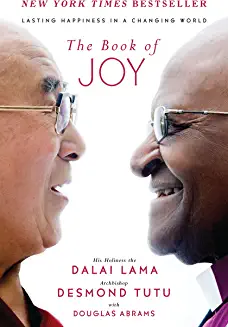
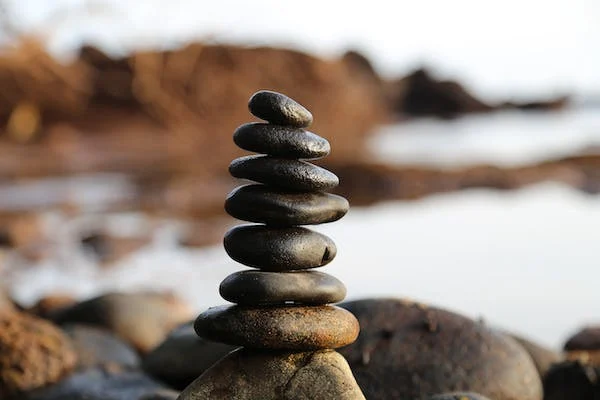
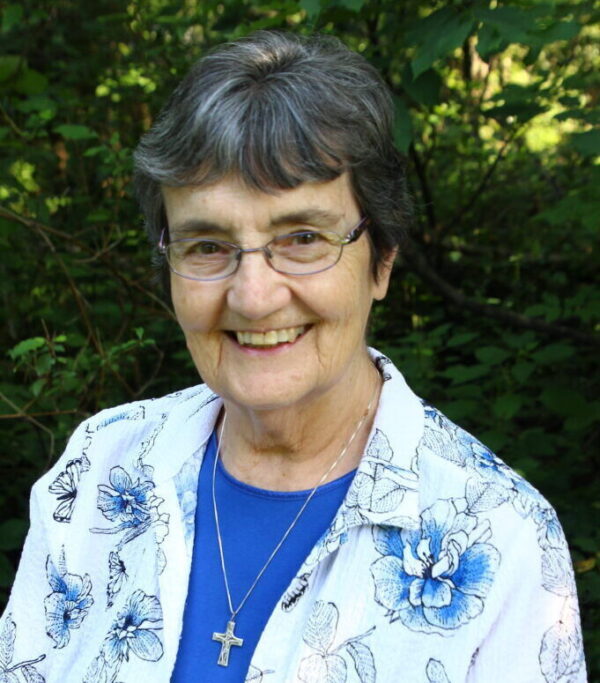

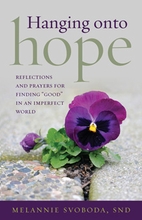

13 Responses
Sr. Melannie,
I too have done prison ministry for awhile. It always amazes me how God’s love pierces through the darkness of prison. The inmates often can be so vulnerable because there is no filter or pretense once they trust you.
Beautiful reflection.
Kathleen
Thank you so much for that reflection on prisoners.
I attended the program on Saturday in Cincinnati, and it was wonderful! Looking at autumn as a gift was different for me. I have, in the past, suffered from seasonal depression, and this time of year is always difficult, as I focus on the dark times and the worse weather and mood coming. Thanks for giving a different perspective. Instead of feeling “imprisoned” by the darkness, maybe I can reflect on these special gifts.
Hope you have a good retreat.
Oddly enough, yesterday I drove by the prison in Lebanon, OH and felt compelled to pray for those inside. Specifically, I asked God to bring light and love to whoever was feeling most desperate and to lift the unrest. I do not feel called to visit inside a prison, although I admire those who do. I can and will visit through prayer. Those numbers you gave are startling. Obviously we need prison reform.
Daily, I pray for the marginalized, the immigrants, the refugees, those subjected to human trafficking, and those struggling to survive in poverty, illness, war, natural calamity, or manmade catastrophe.
But, I had forgotten to hold in prayer their brothers and sisters in prisons. May God bless your reminder.
Enjoy. Joanne
I don’t usually think of prisoners as repentant. Thank you for opening my eyes.
I to visit a prison 4 hours away from my home. I am the mother of a son who worked so hard for his education and married. He was a teacher for a Catholic school. He had a chip on his shoulder and I not sure why? But he and his wife tried for years to have a baby to no avail. Through many doctors and artificial means they conceived a little boy. But at the end he was born deceased. His name was Matthew Cole born and died on November 28th. My son went crazy stupid on blaming God for the baby’s death. So much more to said but he started a relationship with a student. Yes I know this was wrong he didn’t have sex with this student but due to politically environment he was given 27 years in prison. He lost everything and he is label as a sex offender for life. His Dad and I will not see him free before we die and his sister is the only one he still have. I pray so much and he has a wonderful priest who comes on Tuesday to do Mass and Confessions and my son and God are in a relationship. We don’t have money for any lawyer and it is big money and then you say sex offender but let me tell you of the mistruths, people aren’t willing to help. I have learned so much by visiting my son about every 6 weeks. Those are Gods creations too and they for the most part are treated inhumanly and we need to remember them too.
I have begun to assist with the weekly Bible Study with the women jailed in Painesville, OH. The discussion is lively and the depth of their faith is incredible. The women remind me so much of the women on the road to Calvary….weeping more for their children than for themselves. Scripture takes on new meanings when read from the viewpoint of the imprisoned.
This was a powerful blog!!!!Thank you for bringing this to the forefront.
I was on retreat on 10-12 Oct. It was a wonderful time of prayer reflection and direction. Pray yours will be as fulfilling. I have a nephew in the prison system. He is an addict following his parents example. Prais God his Mom my sister is now clean and sober 8 years though it s a daily commitment. We are continuing to pray for his sobriety and convertion.
Sr Melannie,
Prison ministry is very near and dear to my heart. Before the prison closed that was located about 30 miles from my home, I was a regular volunteer with the Residents Encounter Christ (REC) program for about five years. The men who were incarcerated were so appreciative of our Ministry and it moved my heart beyond words to be there. I do miss this part of my life and hope to again some day be blessed to be part of it. Thanks for sharing. I look forward each Monday morning to your blog posting. Thanks for your Ministry to me.
The inmates I write to have become like family to me. Anyone interested in having a prison pen pal can contact me at the above e-mail. Anyone who has or has had a loved one in prison is welcome at the monthly meetings of Families Ministering to Families at St. Mary Magdalen Parish in Altamonte Springs, FL. We meet on the third Sat. morning of each month.
Everyone present has walked the walk.
Jean’s email address is: [email protected]. Sr. Melannie
Thanks for all prayers and help.